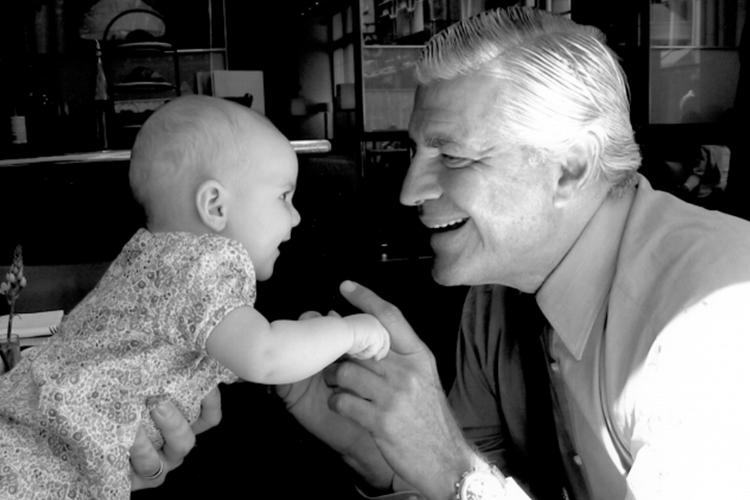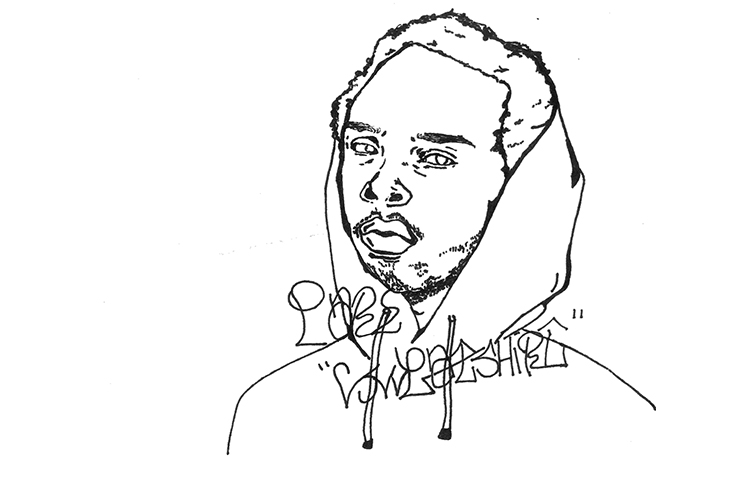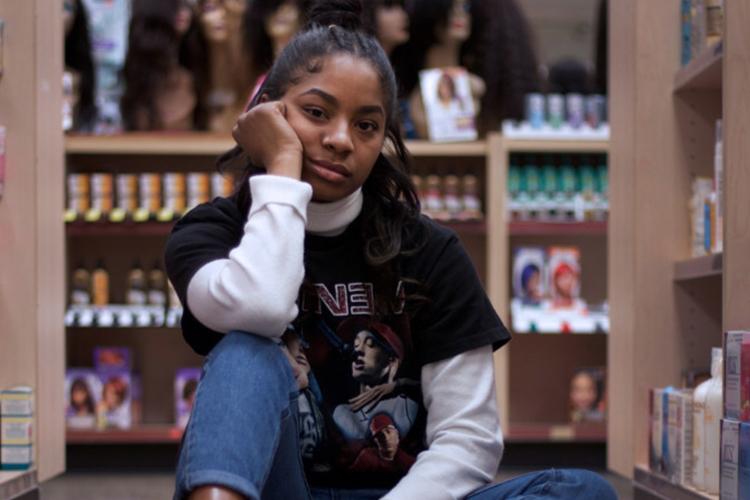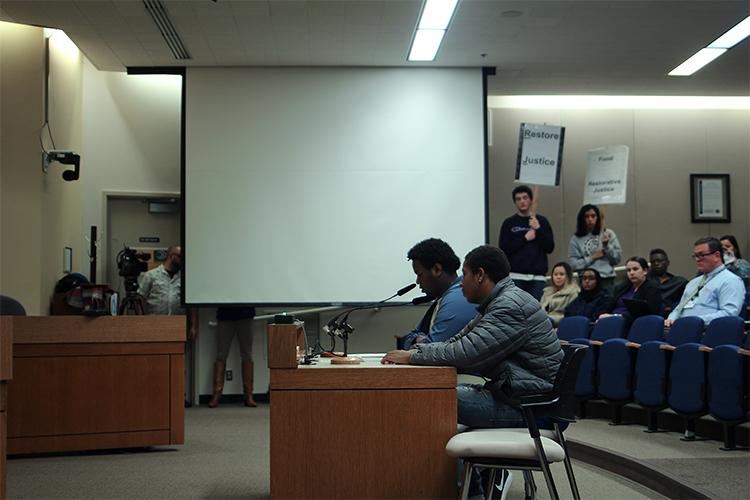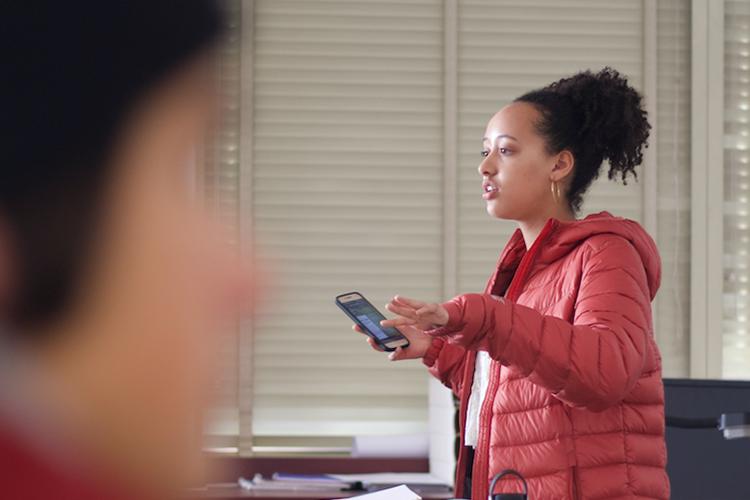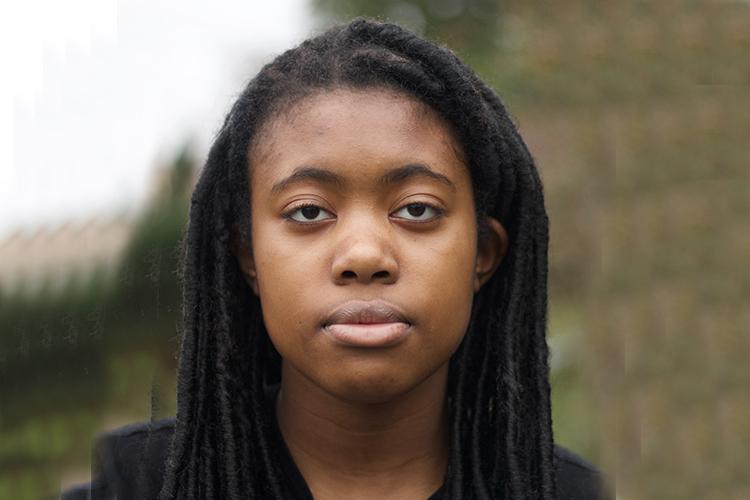
Something about the sun that day has stayed with me over the last six months. As we drove, I stared out the window at the passing trees and watched the sun dip behind them and then pop out over brief deforested areas. I didn’t cry until the rest stop. By then, the sky had changed from gold and greenish to blue and pink and purple and orange. It seemed like the sky was putting on a show to help us say goodbye.
That’s when the tears came. Black mascara tears left two streaks down my face. I stepped out of the car and walked toward the sun. In a matter of minutes, the sky changed again. I was struck by the perfect half moon hanging in the air. Eventually, the sky got dark and I wiped my tears. I didn’t cry again for days.
When my papou passed I didn’t know what to do. I felt so alone, and I isolated myself because I was scared no one would understand. Everyone loses people important to them, yet grief is still such a taboo topic in our country. I felt like I was grieving wrong, but I had no idea of how to grieve “right.” I was lost. I never allowed myself the chance to grieve without comparing my experiences to someone else’s grief.
My relationship with Papou was separate from everything else in my world. When I was little, he seemed larger than life. Even calling him “Papou,” the Greek word for grandfather, felt special to me. None of my friends had a Papou.
When I think about Papou, I think of big dinners, where he would steal food off my plate and give me a smile with a mischievous twinkle in his eye. I think of his cologne, and how he would give my dad shirts that he never wore, so they still smelled like Papou. I think of how stubborn he was, and how much he loved me. He was proud of me since the day I was born.
The first time my parents took me to New York, he threw a party in my honor.
My papou had been sick for as long as I can remember. Growing up, I watched as his health declined rapidly. I barely remember him being able to walk without difficulty. As he got more sick, my mom became a caretaker while we were with him. Seeing a child take care of her father felt strange to me.
When I was little, the relationship between my papou and my mom seemed simple. Despite the distance, they were clearly important people in each other’s lives. Papou always looked at my mom with so much love and pride in his eyes. My mom loved Papou, but her love came with a little bit of pain behind it. He left her and her mom when my mom was a toddler and started a new family that my mom never felt fully welcome in.
After he died, I confronted one question over and over — how do I grieve Papou with my mom when we had such different experiences? As I watched my mom grieve, I tried to figure out how my grief fit in. Some days my mom cried for hours, but my eyes stayed dry. I hated myself for not being consistent. Other days I struggled to hold a conversation or look people in the eye, when my mom seemed happy. On those days I told myself that I didn’t have the right to be sad when she wasn’t. I needed to tell someone how I felt, but I felt like my grief was a burden.
To this day, I feel guilty for never saying goodbye, even though I know that I never had the opportunity to. My mom did get to say goodbye. He passed the day that she got home from New York. I felt like I should’ve gone with my mom to New York and been there to spend one last moment with Papou. But sometimes I felt relieved that I stayed home and that my last memories of him would be good ones. But in the moments that I felt relief, I felt guilty for being relieved. There was no way for me to win.
About a week after Papou died, my family in Greece came together to say their goodbyes to him, attending a memorial mass at a mountainside monastery. Demi, my mom’s first cousin, sent photographs over Facebook Messenger. Looking at the photographs, I felt completely isolated. I immediately felt such an intense, deep sadness knowing that I couldn’t be with the other people who loved my papou the most.
When school started, things only got worse. I couldn’t pay attention in class, my motivation to do homework was nonexistent and in the first two weeks I had multiple anxiety attacks, a couple resulting in my mom coming to pick me up during school. By the end of September, I was behind in most of my classes and too scared to tell my teachers what was going on. I was terrified that my teachers wouldn’t understand, and, worse, I was scared they wouldn’t care. I felt like it was too late, that my period to grieve and hide from the world was over and I had to be a functioning member of society again.
After a few months of me struggling through school and failing classes, my mom decided it was time to reach out to my teachers. She sent an email to all of them, and most wanted to help me. But one teacher never responded and another apologized for the “loss of your grandmother.” I felt confused and angry, and my resentment toward those teachers grew.
In October we flew to New York, arriving at night, and the only thing I could think about was how strange it was to be setting foot in the city that had always belonged to my papou. Even from a young age I felt pride in knowing that my papou, Costas Kondylis the architect, was part of shaping the city’s skyline. To me, New York City will always be his.
It felt surreal knowing that for the first time in my life I was in New York, and he was not. On the drive in from the airport I stared out the window at the dark sky, and could hear my mom crying in the third row of the SUV. I felt deeply uncomfortable, and wished for the drive to be over. I twisted my arm to reach over the seat and hold my mom’s hand. After several minutes my shoulder began to ache, but I couldn’t let go. I stared out the window at the lights of the city approaching and tried to pretend I wasn’t in the car, that I was flying. But I was grounded by my mom’s hand in mine.
A couple days into the trip, we rented a car and drove around the city to see Papou’s buildings. My mom’s godmother, an architect in Geneva, Switzerland, wanted to see the buildings, and I did too. I’d never been able to pick out his buildings, and I wanted to know if seeing his work would make me feel closer to him.
The second stop on our tour was where three of his buildings stood. We parked in front of a fancy hotel and I leaned back to see the tops of all three buildings arching into the sky. I don’t know how long we were parked there when one of the hotel’s doormen came out to ask us why we had been there for so long. I responded by telling him that my grandfather had passed, that we were in town for the memorial and that we were doing a tour of his buildings.
“He designed those,” I said, pointing up at the buildings. In that moment I felt myself fill with pride, that I was the granddaughter of Costas Kondylis, that he had designed over 85 buildings and that we were standing at the feet of three of them. I half expected the doorman to tell us we needed to move the car, but instead he told us to have a nice day and walked back into the building.
That night we drove to Astoria for dinner at Elias Corner, the Greek restaurant that my mom had gone to with Papou time and time again. As soon as we stepped inside I felt like we had been transported to Samos, the island where my family is from. The table next to us was clearly full of Greek Americans, and everyone was talking loudly and laughing. That night was the closest I felt to Papou after he died. The energy in the room felt right for the first time since we had arrived in New York. It felt safe and like a big hug.
Once we were back in our hotel room, my mom wrote the remembrance that she would give at the memorial. I heard her say to my dad that she didn’t know how she would be able to read it in front of strangers. I walked into their part of the room and perched on the edge of my parent’s bed. I told my mom that I would stand with her and that, if she couldn’t get through the remembrance, I would finish it for her.
I pushed my feelings down as we walked up the steps into the Morgan Library, trying to gather the courage to open the doors and walk in like I belonged. I could feel the fear and anxiety coursing through me. I clutched onto my dad’s hand tighter, hoping that maybe we wouldn’t have to go in, that I would wake up and be at home, or anywhere but there.
We opened one of the doors and a security guard informed us that the library was closed for a private event. When my dad told her that we were part of the family, she apologized and held the door for us. My gut twisted and I wished that I could shrink away to nothing when I spotted my mom’s half-sister and her family greeting people as they arrived. I squeezed by with a perfunctory air kiss on each cheek and corralled my younger brother through the throng of people to the seats with our names on them.
After everyone had spoken, I stood in front of a TV screen with a slideshow of pictures, avoiding the conversations during which I revealed that I was Katherine’s daughter, that Costas was my grandfather and where strange people felt like they could hug me and tell me how strong I was. I felt painfully out of place in the room. I knew only a few people in attendance and yet everyone seemed to think they knew me. I felt obligated to help them grieve, even if I had no idea who they were.
Watching the pictures appear and disappear on the screen was soothing. Some of the pictures were clearly my mom’s. Pictures of me crouched next to Papou, so I could be at the same height of him in his wheelchair. Many of the pictures I had never seen before, including one of me standing on a fence in red and white striped pajamas, my arms wrapped around Papou’s neck. He was beaming at the camera, I was looking down. I must have been six or seven when the picture was taken, and it felt strange seeing a picture of myself that I didn’t know existed, from a memory I didn’t have.
Since coming home from New York I’ve tried to sort my feelings into boxes, even though I know that it’s impossible. The process of writing this has made me question every aspect of my grieving. I’ve struggled with ending this story, and I’ve come to realize that it’s because my real life story isn’t done. I don’t feel 100 percent better, despite hours of therapy, and I still struggle with unexplainable fits of sadness. I’m starting to understand that losing Papou is going to be a part of me for the rest of my life. I wish that I could let others in similar positions as me allow their grief to be a part of them in a healthy way. It took me a while to understand that there is no “correct” way to grieve, and all that time I spent comparing my grief to others hindered my ability to find closure. I had to learn to trust myself and validate my own process in order to feel like I was on the right track towards getting my life back.
Papou may not be with us anymore, but he will live forever in my memories.





























